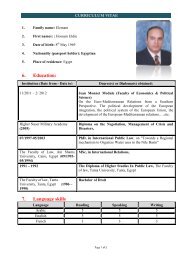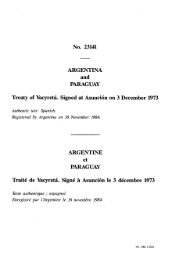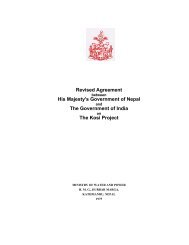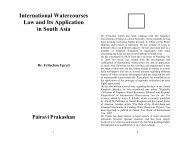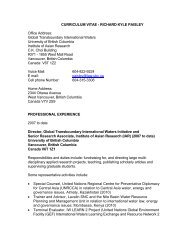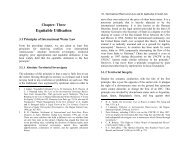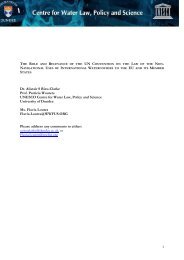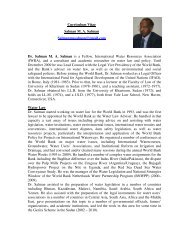Upreti, Trilochan, International Watercourses Law and Its Application ...
Upreti, Trilochan, International Watercourses Law and Its Application ...
Upreti, Trilochan, International Watercourses Law and Its Application ...
You also want an ePaper? Increase the reach of your titles
YUMPU automatically turns print PDFs into web optimized ePapers that Google loves.
Equitable Utilisation / 177 178 / <strong>International</strong> <strong>Watercourses</strong> <strong>Law</strong> <strong>and</strong> <strong>Its</strong> <strong>Application</strong> in South Asiathat “water resources law is surely not ripe for codification.” 239Special Rapporteur McCaffrey has rightly observed that despitesome of the reservations made by member states, the UNCIWis the first legally binding framework instrument with universaljurisdiction, which would contribute to the attainment of thegoals of the Charter of the United Nations (for the peacefulresolution of disputes) by its successful codification <strong>and</strong>progressive development of the rule in international law. 240 Inthe meantime, it must be acknowledged that there is nouniversally accepted definition of equity <strong>and</strong> equitableutilisation. Therefore, there is a lack of unanimity on when <strong>and</strong>how to apply its provisions in circumstances of uniquegeographical, hydrological, or political conditions, <strong>and</strong> there isa large loophole for manoeuvring, which poses a formidablechallenge to codification. Equity has provided court’s withmuch needed flexibility, a flexibility that has already enabled itto reach decisions in matters involving the disparate claims ofdeveloped <strong>and</strong> developing countries over such resources. 241Regarding to significance of equity, however, Higgins cautions,“the general principle of equity <strong>and</strong> proportionalityare meant to oil the wheels of decision-making butwe should be sceptical. The concept of equity,designed to be an aid to decision-making, carrieswith it serious problems.” 242It has been argued that equitable utilisation is the best tool forachieving justice in shared resources, <strong>and</strong> is the best possiblemeans of resolving conflicts. In practice, however, it has far239 R. Jennings, “Keynote Address” in Resolution of <strong>International</strong> WaterDisputes, the <strong>International</strong> Bureau of the Permanent Court ofArbitration (ed), the Hague: Kluwer <strong>Law</strong>, 2003, p. 26: he has arguedthat technical experts also should have been included in thecodification process.240 J. R. Crook & S. C .McCaffrey, "The United Nations Start Work on a<strong>Watercourses</strong> Convention" (1997) in 91 AJIL, pp. 374 – 377.241 Ibid.242 Supra note 76, p. 237.reaching implications with several inherent difficulties. Weak<strong>and</strong> vulnerable countries are in a precarious position in utilisingthese resources due to the numerous obstacles, such as a lack ofcooperation by other watercourse states, lack of capital ortechnology, <strong>and</strong> international reluctance towards anymeaningful cooperation in utilising shared resources. Yetobtaining an integrated <strong>and</strong> holistic approach, good faith,cooperation <strong>and</strong> joint management (including the use of theequitable utilisation rule) appears the best way to maximise thebenefits. 243 Multilateral investment agencies such as the WorldBank, other development banks, UNDP, IMF, GEF, <strong>and</strong> thedeveloped nations must play a more creative role, followingthat played by the World Bank in resolving the disputes overthe Indus Water Treaty. 244 In order to accommodate <strong>and</strong>address the issues of weak <strong>and</strong> vulnerable nations, someconcessions have already been given by instruments orinstitutions such as LOSC, GATT & WTO, 245 the EU, 246 <strong>and</strong>243 A. M. Duda & Mohamed T. El-Ashry, "Addressing the Global Water<strong>and</strong> Environment Crisis Through an Integrated Approach to theManagement of L<strong>and</strong>, Water <strong>and</strong> Ecological Resources" March 2000,in 25 WI, p. 116.244 A. K. Biswas was of the view that the leadership shown by Mr Black,the then President of the World Bank in resolving the Indus treatyshould be followed by other executives of the numerous agencieswhich would be able to achieve broader development <strong>and</strong> equitablesociety.245 Some quota free <strong>and</strong> tariff free entrance for the least developedcountry’s products <strong>and</strong> other concessions have been offered in theFourth Ministerial meeting that took place in Doha in 2001. Also see S.P. Subedi, “The Road from Doha: The Issues for the DevelopmentRound of the WTO <strong>and</strong> The Future of <strong>International</strong> Trade” (2003), in52 ICLQ, p. 426-46.246 Staff, “European Union provides sugar quota”: The Kathm<strong>and</strong>u Post16 April 2003, Under the EBA Scheme the EU has given quotastotalling 4400 ton of raw sugar to Nepal <strong>and</strong> some other l<strong>and</strong>-lockedstates have also received such a quota, which will be tremendouslybeneficial to them. For example, Nepal is making a profit of Rs 30million from this transaction <strong>and</strong> looking to increase sucharrangements in the future.



